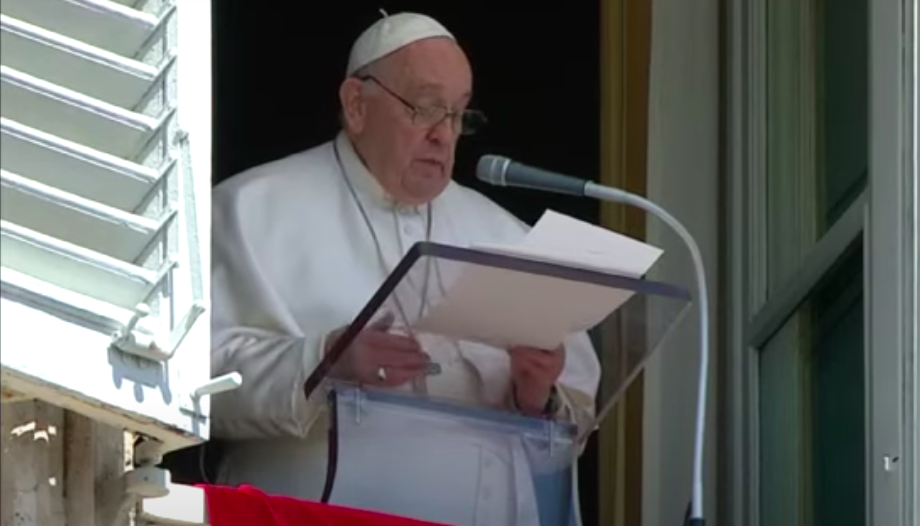After the recitation of the Regina Caeli, in this Divine Mercy Sunday Pope John Paul II, and after greeting the Romans, pilgrims and groups of pilgrims from St. Peter's Square prayer that cultivate the spirituality of the Divine MercyPope Francis today defended "the memory of St. John Paul II, sure of interpreting the sentiments of the faithful throughout the world," calling recent statements about the girl who disappeared in 1983, Emanuela Orlandi, "unfounded suppositions.
"L'Osservatore Romano, the official Vatican newspaper, has described as "madness" the accusations against St. John Paul II by Pietro Orlandi, brother of the missing Vatican girl. In a recent television program, Orlandi assured that it was known within the Vatican that the then Pope used to go out at night accompanied by Polish monsignors, "and not exactly to bless houses".
Andrea Tornielli, editorial director of the Holy See's Dicastery for Communication, described these words in L'Osservatore Romano' as "Madness. And we are not saying this because Karol Wojtyla is a saint or because he was Pope. Although this media massacre saddens and hurts the hearts of millions of believers and non-believers, the defamation must be denounced because it is unworthy to treat in this way in a civil country any person, living or dead," wrote Andrea Tornielli.
Happy Easter to our brothers in the East
Before praying the Regina Caeli, the Holy Father Francis commented on "two apparitions of the Risen Jesus to the disciples, and in particular to Thomas, the unbelieving apostle". And after the recitation of the Easter Marian prayer, he expressed his "closeness to the brothers and sisters of the East who are celebrating Easter today". May "the Risen Lord be with you and fill you with his Holy Spirit. Happy Easter to all of you," the Pope reiterated. Then the Pontiff further extended a special greeting "to our brothers and sisters in Russia and Ukraine who are celebrating Easter today, may the Lord be close to them and help them to make peace".
He went on to point out that "unfortunately, in stark contrast to the Easter message, the wars continue to sow death. Let us grieve for these atrocities and pray for these victims, asking God that they may no longer have to suffer violent death at the hands of man, but be surprised by the life that He gives and renews with His grace".
At that moment, he expressed that he follows "with concern the events in Sudan, I am close to the Sudanese people who have suffered so much, and I encourage you to pray that the weapons be laid down and that dialogue prevails so that together we can continue on the path of peace and harmony".
The Pope also greeted "groups from France, Brazil, Spain, Poland, Lithuania, firefighters from various European countries who have come to Rome today for a large demonstration open to the citizens. Thank you for your service," he greeted them.
Seeking the Risen Christ in the Church
In his opening address, the Holy Father pointed out that the Apostle Thomas "is not the only one who finds it hard to believe. In fact, he represents all of us a little. In fact, it is not always easy to believe, especially when, as in his case, one has suffered a great disappointment.
has followed Jesus for years taking risks and enduring hardships. The Master was crucified as a criminal and no one has freed him. No one has done anything. He has died and everyone is afraid. But Thomas shows that he has courage. While the others are locked up in the cenacle out of fear, he goes out, running the risk that someone might recognize him, denounce him and arrest him".
However, when the Lord "pleases him to show him his wounds, the proofs of his love, which are the ever-open channels of his mercy, Jesus shows them to him but in an ordinary way, in front of everyone, in the community, not outside," the Pope stressed. "As if saying to him: if you want to meet me, do not look far away, stay in the community, with us, do not go away, pray with them, break the Bread with them."
"He says it to us too," the Holy Father Francis continued. "Without the community it is very difficult to find Jesus." And he wondered, "We, where do we look for the Risen One? In some special event? In a spectacular, surprising religious manifestation? *Only in our emotions or sensations? Or in the community, in the Church, accepting the challenge to stay. Even if it is not perfect, despite all its limits and falls, which are our limits and our falls, our Mother Church is the Body of Christ, and there, in the Body of Christ are still and forever imprinted the greatest signs of his love".
Loving the Church, a welcoming home for everyone
"Let us ask ourselves," Pope Francis invited, "if, in the name of this love, in the name of the wounds of Jesus, we are ready to open our arms to those who are wounded by life, without excluding anyone from the Mercy of God, but welcoming everyone, each one, as a brother, as a sister. As God welcomes everyone. God welcomes everyone," he repeated. "May Mary, Mother of Mercy help us to love the Church, and to make a welcoming home for all."








